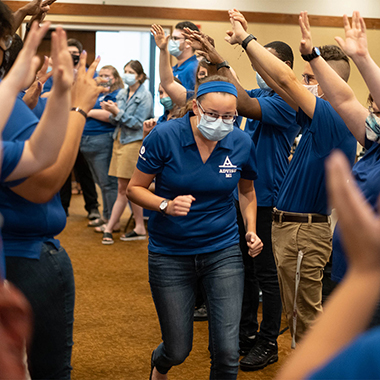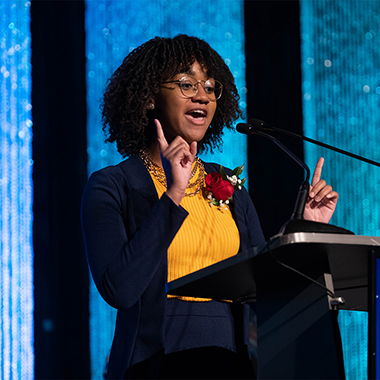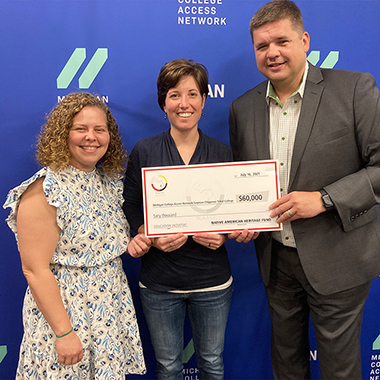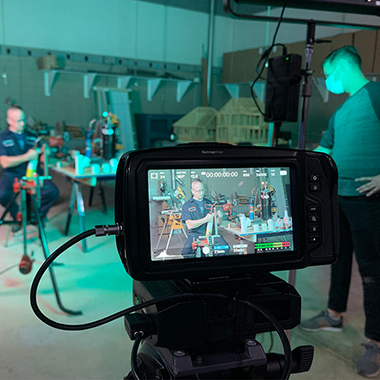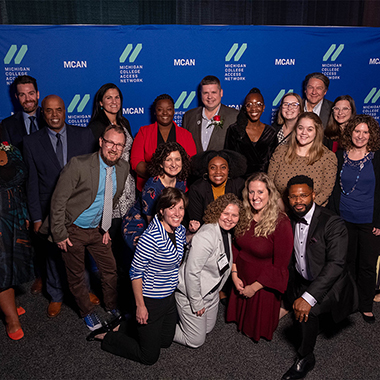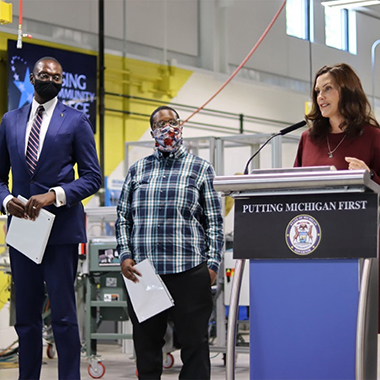2021 Reassessing shifting needs.
A year of strategic growth
Expansion is only impactful if it’s purposeful — and with all of our new additions, programs, and initiatives in 2021, we broadened our scope with Michigan’s students in mind.
Expanding our network and team
One intent-driven accomplishment was launching the Michigan Equity, Courage, Hope and Opportunity Scholarship (MI ECHO). MI ECHO is a tuition-free pathway for frontline workers who hold immigration statuses that prevent them from accessing federal financial aid to pursue an associate degree or certificate at any public community college or tribal college in Michigan. This serves students who are excluded from most traditional financial aid opportunities, such as DACA recipients, Temporary Protected Status immigrants, asylum-pending, Special Immigrant Juveniles, and other populations. We were proud to award MI ECHO scholarships to 23 recipients last year. The impact of MI ECHO doesn’t just move us closer to our Sixty by 30 goal — it creates opportunities for people who have been historically excluded from many college access programs.
College Completion Corps kicked off its second year, expanding to 40 AmeriCorps positions at colleges across the state. This doubled the program's capacity, and was made possible by increased funding from AmeriCorps, the Michigan Community Service Commission, and other philanthropic partners. We also strengthened partnerships with all three of Michigan’s tribal colleges, placing completion coaches at Saginaw Chippewa Tribal College, Keweenaw Bay Ojibwa Community College, and Bay Mills Community College. This was made possible by a $60,000 grant from the Native American Heritage Fund.
To support these new offerings and expansions in 2021, we also expanded our team. Michigan College Access Network grew to 20 employees in 2021, and welcomed a new board member, adding to our capacity to take on new partnerships and keep innovating to reach our goal.
Bolstering existing programs and initiatives
There are certain programs that have become synonymous with MCAN. In 2021, we ensured that, even while we refocused our efforts and introduced new services to address the changing college landscape, we still worked to improve our existing initiatives.
Our 10th annual conference focused on the role of equity and education in economic recovery. The in-person conference was completely sold out with more than 450 attendees, and featured three keynote speakers and 28 breakout sessions. The Higher Education Showcase featured 32 different institutions, and the College Access Impact Awards program honored 13 individuals and organizations. But beyond all of these panels, discussions, and awards, we were able to build on something even stronger: connection. After being separated for years due to the pandemic, coming together at the 2021 conference was more crucial than ever for learning and strengthening partnerships.
In the virtual realm, Advocacy Week 2021 was our largest-ever advocacy event. We had 150 registered participants and scheduled meetings with 67 legislators spanning from Detroit to the Upper Peninsula. The bipartisan event brought together college access advocates, students, business leaders, activists, and legislators from across the political spectrum. These conversations pushed for four legislative priorities: continuing to fund Michigan Reconnect, increasing funding for public higher education, allocating funding to improve the student to counselor ratio, and encouraging the continuation of MCAN’s budget appropriation.
Continuing on the legislative front, our advocacy efforts endured throughout 2021 in support of the fiscal year 2022 State of Michigan budget. In September, the legislature announced a $70 million, bipartisan budget agreement, including investment in several postsecondary education priorities: a $55 million expansion of Michigan Reconnect, $25 million to support Futures for Frontliners, and $6 million to fund wraparound services for degree completion. Also part of the budget agreement was a 1% increase in base funding for operations at universities and community colleges, with a one-time 4% increase to help keep tuition costs down. These were major wins for Michigan’s postsecondary landscape. They will continue to move the needle toward Sixty by 30 and improve our communities.
In another major win, MCAN received a $1 million AmeriCorps investment via the Michigan Community Service Commission and the office of Gov. Gretchen Whitmer. This funding came as part of Michigan's $24.5 million AmeriCorps investment and supported the AdviseMI and College Completion Corps work underway at 85 partner sites across the state.
While maintaining momentum through 2021, we introduced the second cohort of the Michigan Partnership for Academic Transitions. These five college and high school learning teams work alongside creative teams to brainstorm and execute solutions to boost the number of first-year community college students who complete a gateway (credit-bearing and transferable) math course.
We stayed focused on professional development as well, hosting the 2021 Maritime Academies for more than 50 participants. MCAN staff and LCAN representatives from across the state met in Grand Rapids for three days of intensive learning around the Collective Impact framework and systems-level change. Additionally, our Foundations of Equity in College and Career Counseling course provided counselors, advisers, and other educators with an opportunity to build upon their knowledge of equity-centered counseling and advising practices.
“MI ECHO is the college savings my parents never had the opportunity of preparing for me, because they also lived in poverty. This scholarship will allow me to build a better future for my daughters and allow me to access educational opportunities that were once financially unattainable.”
Establishing new partnerships
MCAN is a network of long-standing connections — and in addition to sustaining those existing relationships, we strive to build new collaborations along the way. In 2021, we established a new partnership with the Michigan Association for College Admission Counseling (MACAC) to invest nearly $3,500 in scholarships for 217 public school counselors across Michigan. With this scholarship funding, we were able to waive MACAC membership fees for the 2021-22 school year and, as a result, give more school counselors a seat at the table.
We also partnered with Xello, a modern college, career, and future readiness software, to co-host a new series of professional devleopment webinars for K-12 educators in Michigan. These free, monthly sessions helped us distribute flexible, personalized educational content regarding career counseling for educators and advisers. By the completion of the series this year, more than 2,434 total participants representing 26 states were engaged in the webinars.
Another new partner, Western Governors University, awarded MCAN with a $5,000 sponsorship to support our College Completion Corps program. This improved our AmeriCorps member outreach at 18 college campuses across Michigan, which advanced access to college persistence tools for approximately 2,000 students who are first-generation college-going students, low-income students, and/or students of color.
MCAN also received a $150,000 grant from Leinweber Foundation, dedicated to general operating support. This major accomplishment marks MCAN’s second grant from the foundation, an increase from $100,000 of support in 2021. This funding will greatly increase our organizational capacity, which will be crucial as we continue to build our network and expand the scope of our support.
Maintaining strong pandemic support
One year after the start of the COVID-19 pandemic, the effects continued to impact how students and families accessed financial aid resources — and it will impact the entire postsecondary education landscape for decades to come. To address this, we continued to uphold a number of existing financial aid-centric programs, such as the Second Annual Governor's FAFSA Challenge, while introducing new FAFSA initiatives to keep moving forward.
In May, we awarded a total of $50,000 to 5,000 high school seniors as an incentive for FAFSA completion through the Dash for Cash program, as part of the Spring Into College statewide effort. Coordinated as part of a new partnership with the Michigan Department of Treasury, Dash for Cash aimed to increase FAFSA completion rates in Michigan, which decreased by approximately 5% from 2020 to 2021 largely as a result of the pandemic. In addition to the Dash for Cash incentives, MCAN also awarded $30,000 to 21 Michigan high schools for FAFSA completion efforts and offered students summer FAFSA assistance with informational materials, help sessions, and one-on-one support.
Along with the College & Career Access Center of Jackson, MCAN was awarded $150,000 in grants from the National College Attainment Network and The Kresge Foundation’s Education Program to improve FAFSA completion and college application rates in Michigan. MCAN’s $50,000 portion of the funding was used to support FAFSA completion programs like Dash for Cash, postsecondary advising, and matriculation support initiatives.
“I work to create a college-going culture by uplifting and empowering students, letting them know their dreams and goals are possible, regardless of other people’s opinions. I’m building a college-going culture by sharing my own story as a way to connect with students and then listening to their stories.”
To further address changing student needs, MCAN introduced a new service to provide Michigan residents with information on all things college: our College Access Virtual Assistant, or CAVA. To keep pace with an increasingly virtual, post-pandemic world, CAVA is a web- and text-based bot that is able to not only answer students’ questions about college in real time, but connect them with resources, support, and up-to-date information on the college going process. From FAFSA application to actual enrollment, CAVA is programmed to be there every step of the way.
Disbursing grants
Last year, MCAN welcomed four schools into the third year of our Reach Higher High School Grant program with the Reach Higher System Impact Grant. Each school received up to $20,000 to go toward fostering a college-going culture in their communities; identifying multiple postsecondary education pathways and facilitating smooth transitions; and improving college affordability and supporting credential completion. We also announced a cohort of 10 new schools as part of the Year 2 Reach Higher High School Grants. These schools completed the first year of the Reach Higher High School Grant program, and each received $5,000 to improve and strengthen their postsecondary advisory council, scale their College Bound Michigan initiatives, collaborate on sustainable action plans, and more. These grants empower high schools and direct service programs to expand their capacity, by taking on new initiatives to meet students’ changing needs.
Our College Decision Day Mini Grants also provided financial support throughout 2021. With this funding, schools across the state were able to host community celebrations for college-bound students. These celebrations are intended to not only recognize students for a job well done, but to help create a college-going culture in these communities.
Throughout 2021, we disbursed a total of $238,750 in Local College Access Network (LCAN) grants to support college access initiatives at the community level, and $238,750 in Innovative Program Grants to drive progressive initiatives. The Oceana College Access Network received our Continuous Improvement Grant, with $20,000 to support the expansion of its college access network and improved data collection practices. Talent 2025 was awarded $10,000 through an Innovative Program Grant that supports building a college-going culture in Lake, Oceana, and Mason counties, and Otsego Community Foundation received $20,000 to launch a new LCAN.
“We are very excited about our partnership with MCAN and the assistance from the NAHF grant, which will allow us to provide additional high-quality student support services and resources that are specific to the demographics and experiences of our student population. These support services will help us increase the number of students achieving their educational goals here at Bay Mills Community College.”
Looking to the future
For both MCAN and the postsecondary education landscape in general, change is on the horizon. With our new Strategic Plan approved in December 2021, we moved forward to address new needs and audiences, expanding our scope to keep pace with change. This updated plan reaffirmed our commitment to building the capacity of communities through LCANs; convening critical leaders and organizations; partnering with like-minded, mission-aligned organizations; and disseminating pertinent data across the state.
With every accomplishment in 2021, we were not focused on improving our own reputation or winning for the sake of winning. These undertakings were rooted in strategy and intent to directly improve the lives and future of Michigan students. To improve our state’s economy. To support the old while welcoming the new, regardless of the circumstances. To return forward.
Top Accomplishments
- Launched the MI ECHO Scholarship, a tuition-free pathway for frontline workers who are not eligible for federal financial aid to pursue an associate degree or certificate
- Awarded a total of $50,000 to 5,000 high school seniors as an incentive for FAFSA completion through the Dash for Cash program, as part of the Spring Into College statewide effort
- Welcomed more than 450 attendees at our sold-out, in-person conference, with three keynote speakers and 28 breakout sessions
- Hosted our largest-ever advocacy event, 2021 Virtual Advocacy Week, with 150 registered participants and scheduled meetings with 67 legislators
- Expanded the College Completion Corps to 40 AmeriCorps positions at colleges across the state
- Received a $1 million AmeriCorps investment via the Michigan Community Service Commission and the office of Gov. Whitmer
- Invested nearly $3,500 in scholarships for 217 public school counselors across Michigan through a new partnership with the Michigan Association for College Admission Counseling
- Earned $5,000 to support College Completion Corps from Western Governors University
- Developed partnerships with all three of Michigan’s tribal colleges as part of a $60,000 grant from Native American Heritage Fund
- Introduced a new Strategic Plan to restructure MCAN’s priorities and efforts
